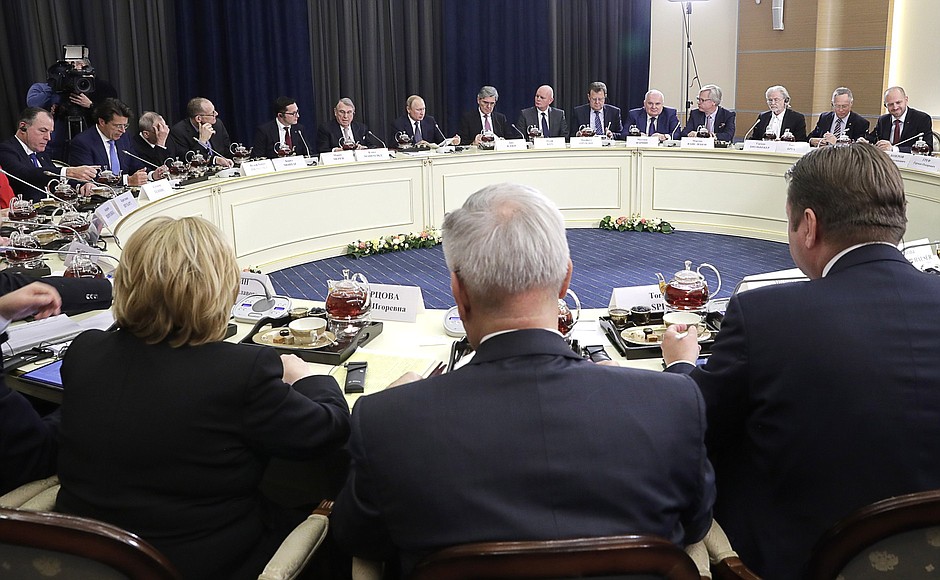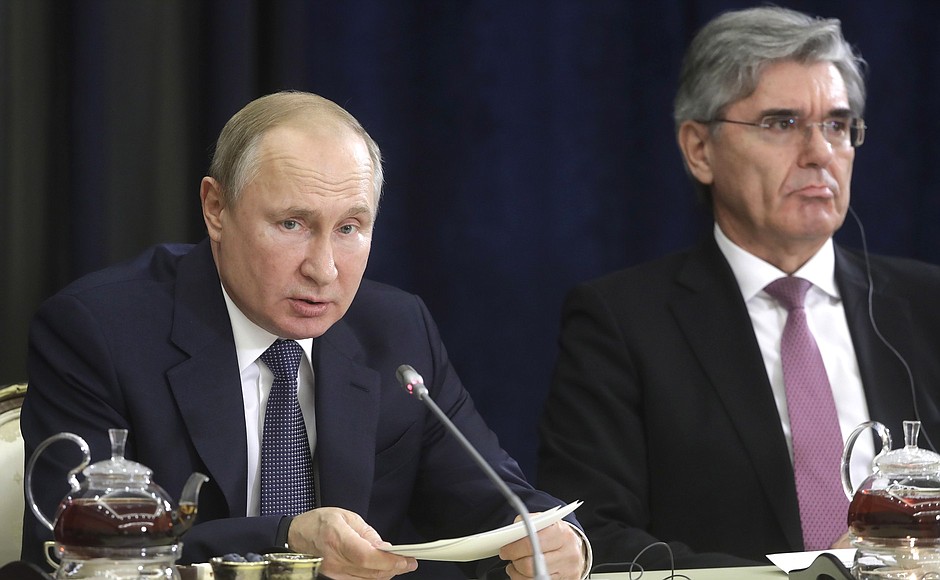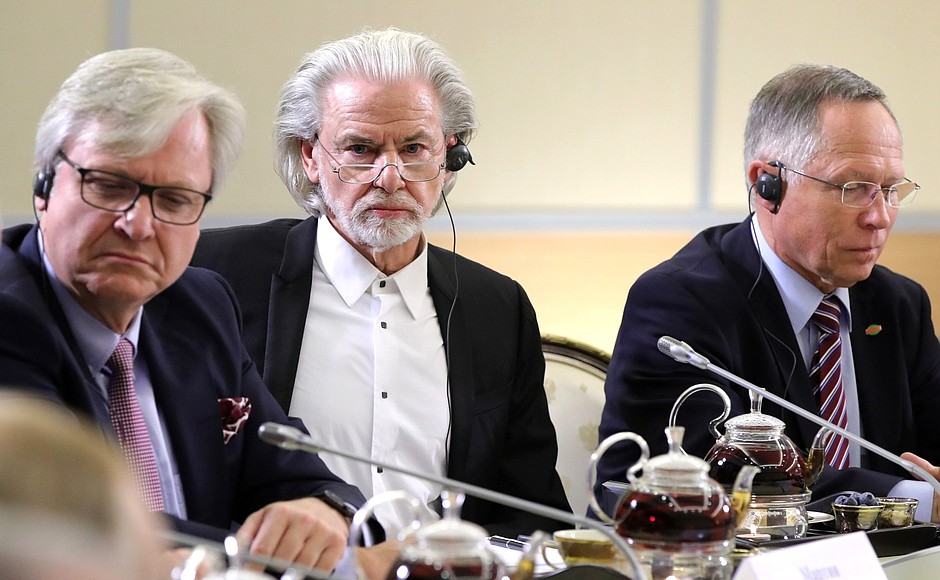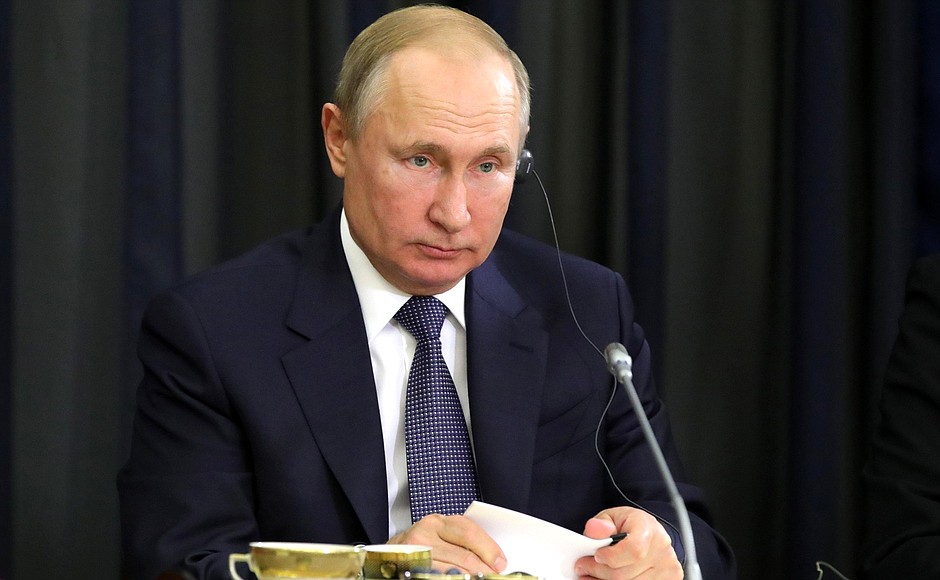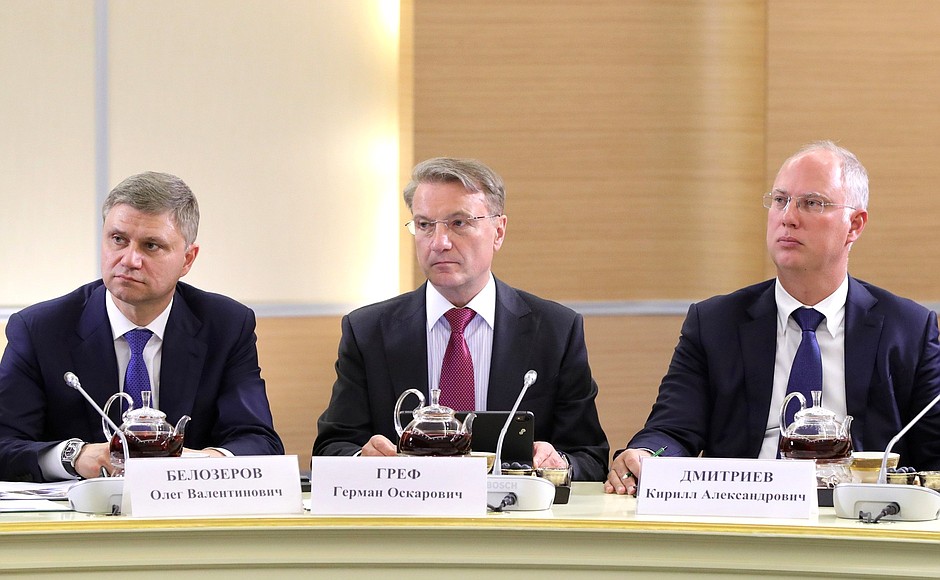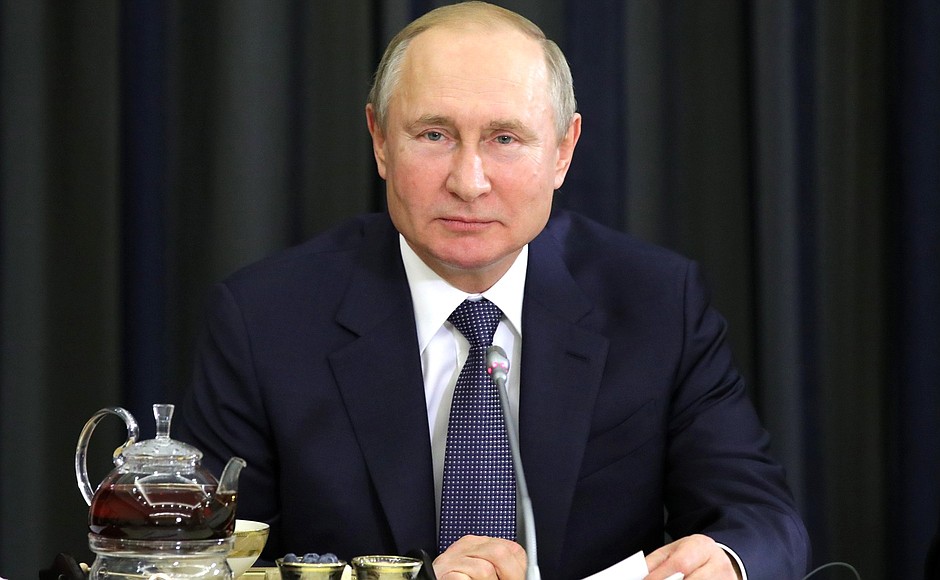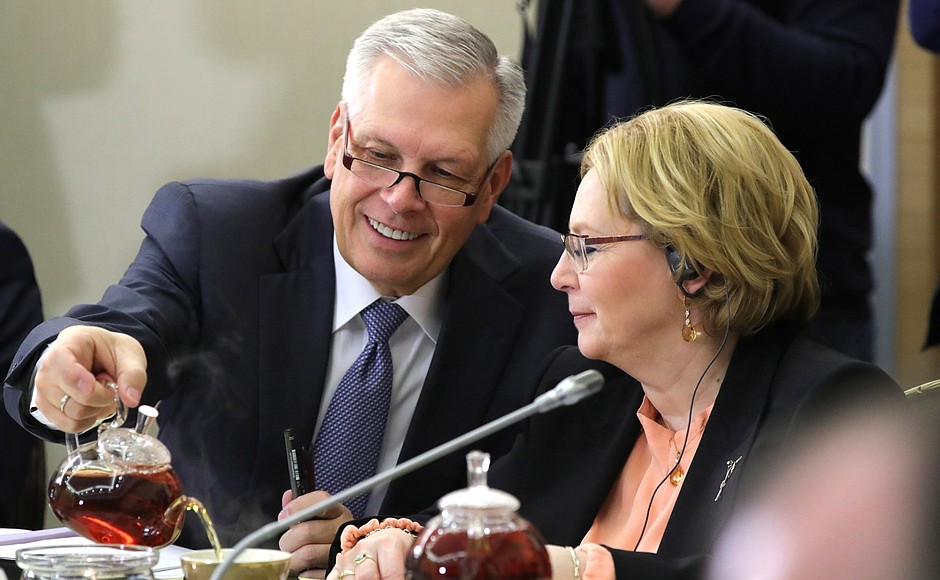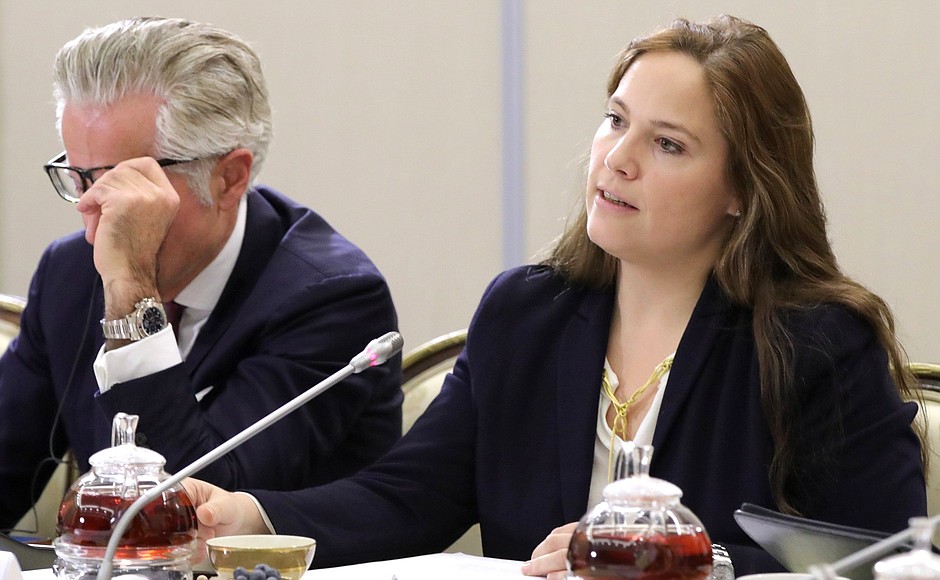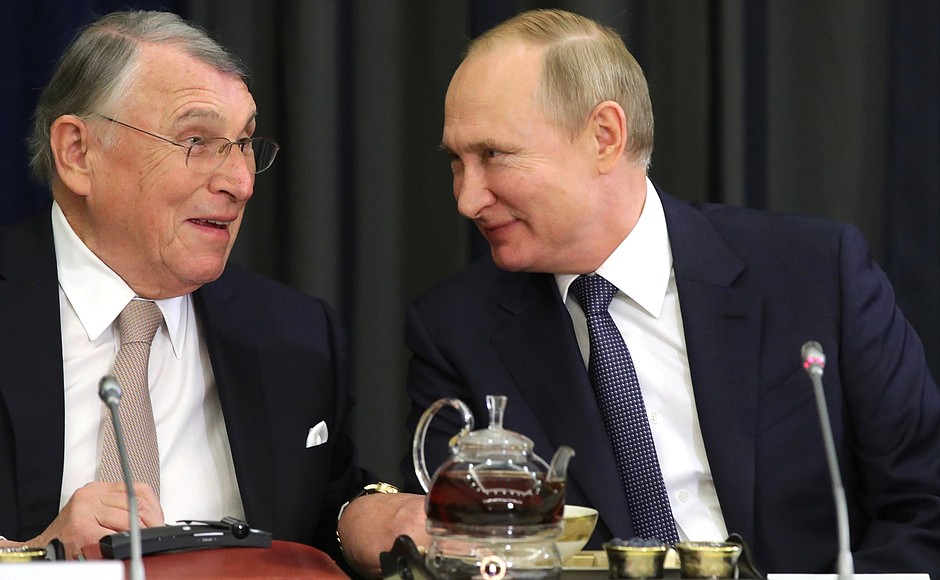President of Russia Vladimir Putin: Good afternoon, colleagues.
I am pleased to once again welcome the German Committee on Eastern European Economic Relations, our friends, leading German entrepreneurs.
Our meetings have become a good tradition. We are meeting in this format for the fourth time to discuss our current cooperation and exchange views on the projects with the most potential in various areas.
Germany is among our most important economic partners. We highly value German business pragmatism and willingness to work together and we want to continue the consistent development of bilateral ties, which of course will be in both countries’ long-term interests.
Today, German investment in the Russian economy exceeds $20 billion, and the Russian investment in the German economy totals almost $10 billion.
There are about 5,000 companies with German capital operating in Russia. Their cumulative business volume is $50 billion.
Germany is Russia’s second largest foreign trade partner after the People’s Republic of China. Quite recently Germany has been ranked first. I hope we will return to this.
In 2018, our mutual trade grew by 20 percent and reached $60 billion. German companies export cutting-edge equipment and machinery to the Russian market, and also take part in the programmes to develop and modernise Russian industry and infrastructure.
With German technology and investment, Russia manufactures automobiles and trucks, railway and agricultural equipment, electrical equipment and construction materials. German retail companies are expanding their presence on the Russian market.
In turn, Russia covers over a third of Germany’s demand for energy resources: 33 percent of its oil and 35 percent of its natural gas. Last year, a record volume of Russian gas fuel – 55.5 billion cubic meters – was delivered to Germany.
Russian-German contacts and interaction in the energy sphere date back several decades. In the 1970s, our countries successfully implemented the Gas for Pipes landmark project, and since then, European customers have enjoyed reliable, uninterrupted gas supplies.
Several years ago, jointly with German partners, we built and launched the world’s largest – 1,224 kilometre – underwater gas pipeline, Nord Stream 1, with an annual capacity of 55 billion cubic metres, to deliver gas to Europe.
The construction of Nord Stream 2 is nearing completion; it will double the volume of Russian gas to be delivered along the Baltic route.
This will be another contribution to meeting the demand for energy all across Germany and in a number of other countries, and will help strengthen energy security on the European continent.
I would like to emphasise again, that this is a purely commercial project, and the government takes almost no part in it. In order to prevent loose interpretation, I have repeatedly said this, and want to say again that this does not mean that Russia is going to stop gas transit through Ukraine. This is not an issue of territory, but rather of economic expediency.
As you know, now we are holding talks with our Ukrainian partners in Vienna. I can see requests from both sides, which, to be frank, are hard to fulfil. But I hope that the parties to these talks, which are economic entities on both sides, will be able to find acceptable solutions.
I have said this many times and would like to repeat that we are interested in making foreign, including German, businesspeople feel as comfortable as possible on the Russian market. We are taking measures to improve the business and investment climate in Russia.
Of course, we have not succeeded at everything yet, but this work will continue. In so doing, we are taking into account the opinion of businesses, including our foreign partners’ wishes.
Russia regularly hosts large international economic events such as the St Petersburg and Eastern forums. Germany is always well represented at these forums. I would like to take this opportunity to invite you to attend them next year.
There is macroeconomic stability in Russia. Last year the GDP grew by 2.3 percent, and this year it will be a little bit smaller, but the positive trend will still remain.
Last year industrial production grew by three percent. The unemployment rate is low: 4.6 percent, and inflation is at 3.6 percent. This is Russia’s historical minimum; there has never been such a low level of inflation in the contemporary history of Russia.
Many things are being done to lift administrative barriers and to provide the best tax conditions for businesses, which resulted in the World Bank’s experts regularly raising Russia’s ranking.
Special economic zones and priority development areas have been established in a number of Russian regions, where investors can get an entire range of benefits that can significantly decrease overall expenses.
Foreign companies are offered special investment contracts with access to a larger number of state support measures if they localise their production in Russia.
But, colleagues, you know this all very well. We have discussed this many times. I see Cathrina [Claas-Muhlhauser] nodding: we have discussed this with her many times, too. I hope that all these issues we have discussed are resolved, and if not, we are ready to continue this discussion today.
Colleagues,
During this meeting we will have a chance to raise any practical issues related to your work on the Russian market.
I would like to thank you for being here in Russia today and continuing your work with us as well as for your interest in this joint work.
I would like to note that our joint work is progressing and has a positive effect on the social sphere, preserving and increasing jobs, developing industry and providing stability on various markets in Europe and the world in general.
You may have noticed that we have always had stable relations with our economic partners regardless of the political environment and have never used any economic leverage to address political issues. I would like to assure you that we will do the same in the future.
Thank you very much for your attention.
Deputy Chair of the German Committee on Eastern European Economic Relations and Chair of the Supervisory Board at CLAAS KGaA mbH Cathrina Claas-Muhlhauser (retranslated): Mr President, ministers, ladies and gentlemen,
Thank you for providing me the opportunity to be part of this conversation on behalf of the German Committee on Eastern European Economic Relations. It is a great honour for me to lead this delegation.
Initially planned for December 9, the meeting was rescheduled for today. We are grateful for the opportunity to have this meeting nevertheless. In three days, Paris will host the Normandy format meeting, and we hope, Mr President, that everything goes well so that there is finally progress in moving towards peace in Ukraine.
This is the first meeting of this kind over the past three years or even more, and it is the first time that its participants are meeting in this format. This means that it is also the first time that we have an opportunity to turn the page in European relations.
Mr President,
Let me be totally honest with you: the business community places great hopes on the Paris meeting. After five challenging years filled with conflict and economic problems, there is finally good news and an opportunity for political unity.
On behalf of the business community, we would like to contribute to achieving progress in the implementation of the Minsk agreements. It is for this reason that we launched an initiative related to the European Stability and Growth Pact for Ukraine in order to offer new development opportunities to people living in a region ridden with conflict and crisis.
In order to ensure this progress in the long-run, we would like to launch a dialogue between Russia and Europe on creating a common economic space from Lisbon to Vladivostok. It is our belief that this is the way to overcome division on our continent.
We would be very grateful, Mr President, if you supported the eight proposals that we prepared. We would like your government to support them so that Russia becomes a supporter and partner in implementing this Stability and Growth Pact.
Progress in implementing the Minsk agreements could pave the way to lifting mutual sanctions. We always supported the position whereby the EU does not have to wait until the Minsk agreements are fully executed in order to lift sanctions.
We mentioned the fact that the sanctions should be lifted in lockstep with implementing the provisions of the Minsk agreements. We hope that the sanctions can begin to be lifted after the Paris meeting, because the billions that are lost because of them could be invested in restoring the economy and increasing our continent’s competitiveness.
The energy dialogue between the EU, Ukraine and Russia is also important in overcoming the conflict. As we know, the conditions for gas transit from Russia through Ukraine must be and will be set by the end of the year.
Time is running out, and these talks can be used to build trust and find compromises that are acceptable to all parties.
We are convinced that it is important to preserve Ukraine’s transit network in order to ensure reliable and lasting supplies of the Russian gas to Europe.
We are also confident that the Nord Stream 2 project will be a great success. We need both. We need two routes, because the demand for gas is up, and piping gas is the best way to deliver it.
If we are unable to overcome political tensions, we certainly will not be able to realise the great potential of economic cooperation on our continent, and we will fall behind the United States and China. Unfortunately, we indeed have lost time. Russian-German trade is still lagging behind the all-time high statistics of 2012.
The good news is that German business continues to invest in Russia. Today, you will most likely hear a lot of positive examples, and the Russian market holds a lot of promise for us.
In order to increase the positive dynamics, it is imperative to overcome the risks associated with the sanctions, to reduce bureaucratic barriers and to be more pragmatic about localisation goals. Recent surveys by the German-Russian Chamber of Commerce confirm this.
The Russian Government is on the right track in general, and the World Bank has improved Russia’s rankings. This obvious progress needs wider promotion, which is our goal.
That is why we attend every St Petersburg Economic Forum and try to be represented there as extensively as possible. We would be happy to see Germany become a partner country of the St Petersburg Forum before 2021.
I would like to end my remarks with this proposal. There are many representatives of German business here who are anxious to share their ideas. Mr President, thank you for the opportunity to have this dialogue.
Thank you.
<…>
